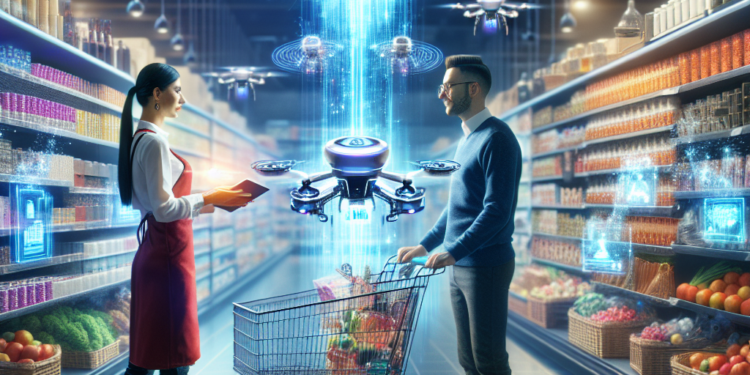In today’s digital age, technology is rapidly transforming the way business is conducted across all industries, and the retail sector is no exception. With the rise of artificial intelligence (AI) and machine learning, retailers are finding new and innovative ways to enhance the customer experience, optimize operations, and increase sales.
One retailer that has successfully harnessed the power of AI to revolutionize its business is online giant Amazon. Through its use of sophisticated AI algorithms and machine learning technology, Amazon has been able to create a highly personalized shopping experience for its customers, leveraging data analytics to predict consumer behavior and tailor recommendations to individual preferences.
But it’s not just the e-commerce players that are benefiting from AI technology. Traditional brick-and-mortar retailers are also using AI to drive growth and improve efficiency. One such retailer is Walmart, which has implemented a range of AI-powered tools to optimize inventory management, streamline supply chain operations, and enhance the customer shopping experience.
AI-powered chatbots, for example, have enabled Walmart to provide instant customer service support, answering inquiries and resolving issues in real-time. These chatbots are trained using natural language processing (NLP) techniques to understand and respond to customer queries, providing a more personalized and efficient customer experience.
Another key area where AI is transforming retail is in predictive analytics. By analyzing massive amounts of data from sources such as sales transactions, social media interactions, and website behavior, retailers can gain valuable insights into consumer trends and preferences. This enables them to forecast demand, optimize pricing strategies, and develop targeted marketing campaigns that resonate with their target audience.
Furthermore, AI-powered image recognition technology is being used to enhance the shopping experience both online and in-store. Retailers can now use AI algorithms to analyze product images and automatically tag and categorize items, making it easier for customers to search and find products. In addition, retailers can leverage AI-powered visual search tools that allow customers to snap a photo of a product and instantly find similar items available for purchase.
One company that has successfully leveraged AI image recognition technology is fashion retailer ASOS. By implementing a visual search feature on its website and mobile app, ASOS has made it easier for customers to discover and purchase products based on their preferences and style preferences. Customers can simply upload a photo of an outfit they like, and the AI-powered visual search tool will find similar items available for purchase on ASOS’s platform.
In addition to enhancing the customer shopping experience, AI is also helping retailers optimize their operations and drive efficiencies. By using predictive analytics and machine learning algorithms, retailers can forecast demand, reduce excess inventory, and optimize product assortment. This enables retailers to make data-driven decisions that minimize stockouts, improve profitability, and enhance customer satisfaction.
One retailer that has successfully implemented AI in its operations is Starbucks. By leveraging AI-powered forecasting models, Starbucks has been able to predict customer demand for its products with a high degree of accuracy. This allows the company to adjust inventory levels and staffing schedules in real-time, ensuring that customers always have access to their favorite drinks and snacks.
In conclusion, AI is transforming the retail industry in profound ways, enabling retailers to create more personalized shopping experiences, optimize operations, and drive growth. By leveraging the power of AI and machine learning technology, retailers can gain valuable insights into consumer behavior, streamline operations, and enhance customer engagement. As AI continues to evolve and mature, it will undoubtedly play an increasingly important role in shaping the future of retail. Retailers that embrace AI technology and adapt to the changing landscape will be well-positioned to succeed in the digital era.













